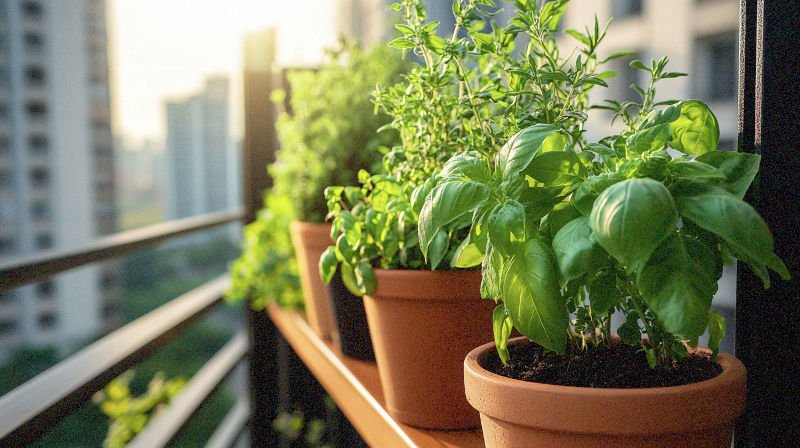Dreaming of fresh basil or mint just steps from your kitchen? Learning how to start a balcony herb garden is simpler than you think — even if your outdoor space is tiny.
With the right setup, containers, and herb selection, you can grow a thriving mini-garden that adds flavor, fragrance, and greenery to your daily life.
What Herbs Grow Best On A Balcony?
Some of the best herbs to grow on a balcony are basil, mint, chives, parsley, rosemary, and thyme.
They’re compact, container-friendly, and thrive in urban conditions when given proper care.
Which Herbs Are Easiest For Beginners?
If you’re just starting out, I always recommend mint (resilient and forgiving), basil (fast-growing), and parsley (low fuss).
These herbs have simple care needs and are forgiving of beginner mistakes.
Want even more easy picks? Check out our guide on Easiest Herbs To Grow Indoors.
How Much Sunlight Do Balcony Herbs Need?
Most herbs love the sun. Aim for 5–6 hours of direct light daily.
South-facing balconies are ideal, while east or west-facing ones also work with sun-tolerant herbs like thyme and oregano.

How Do You Set Up A Balcony Herb Garden?
To successfully set up a balcony herb garden, follow these simple steps tailored for small-space success:
- Choose the Right Containers: Start with breathable pots like terracotta for airflow, or use self-watering planters to reduce maintenance in summer. For tight balconies, vertical planters or railing baskets save precious space. For creative ideas, explore our Small Space Gardening Ideas.
- Ensure Proper Drainage: Drainage holes are essential to prevent root rot. Herbs like rosemary and thyme are especially sensitive to soggy conditions. Add gravel or broken pottery at the base of pots to help excess water escape.
- Use Quality Potting Mix: Fill your containers with well-draining, nutrient-rich potting soil — not regular garden soil, which compacts and suffocates roots.
- Select Your Herbs: Pick compact, sun-loving herbs like basil, parsley, and thyme. Maintain good airflow between pots to reduce disease risk.
- Optimize Vertical Space: If you’re tight on square footage, stack planters, hang herbs, or use shelf units. Companion planting is another great space-saving trick. Get inspired by our Hanging Indoor Herb Garden guide — many tips work just as well outdoors.
- Position According to Sunlight: Place your herbs where they get 5–6 hours of light per day. South-facing balconies are ideal, but partial-sun spots work too with shade-tolerant herbs.
How Often Should You Water Balcony Herbs?
Watering frequency depends on heat, humidity, and pot size. Generally, water when the top inch of soil feels dry — every 1–2 days in summer and less in cooler seasons.
What Are Signs Of Overwatering Or Underwatering?
Yellow, limp leaves typically signal overwatering. If your herbs are drooping with dry soil, they’re thirsty. I’ve accidentally drowned basil before — so trust me, drainage and checking soil moisture matter.
If you’re growing basil specifically, our full post on Basil Watering Signs breaks it down with pictures.
How Do Weather Conditions Affect Herb Watering?
On hot, windy days, evaporation increases — so your herbs may need daily watering. During rainy weeks, you might skip watering altogether. Always adjust based on actual soil feel, not the calendar.
Consider drought-tolerant herbs like rosemary or oregano. For more, read our roundup of Drought-Tolerant Plants for Pots.
Why Is Location Important For Balcony Herb Gardening?
The orientation of your balcony affects sun, wind, and moisture exposure — all of which directly impact which herbs will thrive. Matching herb types to your balcony’s microclimate increases success dramatically.
How Does Wind Exposure Affect Balcony Herbs?
Strong winds dry out soil quickly and can break fragile stems. Shield delicate herbs like cilantro and basil with barriers or position them behind sturdier plants like rosemary.
Growing herbs in windy conditions? Here’s how to protect your plants naturally from pests when airflow increases their presence.
Can You Grow Herbs Without Direct Sunlight?
Yes, but your options are fewer. Herbs like mint, chervil, and lemon balm do well with just a few hours of indirect light. Also, consider growing indoors — we cover this in our Indoor Herb Garden Ideas post.
I'm George Brown, a passionate gardener and the founder of UrbanLeafy.com. I love helping beginners grow fresh herbs, plants and greenery, whether on a windowsill, in a garden or a tiny balcony. My practical, no-fluff tips have been featured in Homes & Gardens, Livingetc, and Best Life, and are rooted in years of real experience. If you're ready to turn your space into a thriving herb haven, you’re in the right place.



